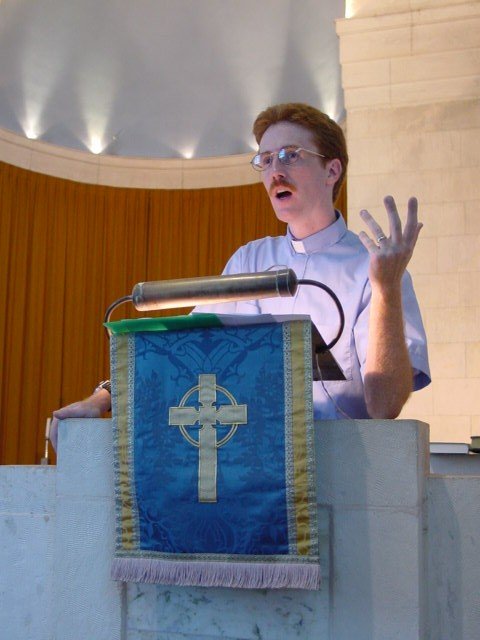July 15, 2001
Marthame preaching at St. Andrew’s Church of Scotland in West Jerusalem.
The pastor at St. Andrew's Church of Scotland in Jerusalem had invited Marthame to preach there today. The pastor is on vacation back home this month, and our more flexible summer schedule gave us the chance to be able to say, "yes." It's been over a year since Marthame has led a full worship service; though he has participated regularly in small ways in Zababdeh, the language barrier has prevented fuller involvement. Thus it was nice to check that muscle memory. And apart from leading the congregation in reading the wrong psalm (full of all kinds of wonderful Hebrew Bible unpronounceables), the muscles still worked. His sermon focused on the story of the Good Samaritan, the lectionary text for the day.
We joined some of the congregation as their guests for lunch in East Jerusalem, then we lounged around the rest of the afternoon, putting together our amateur Sherlock Holmes skills to last night's mystery (still sticking with the balcony-hopper theory, though Elizabeth's "trained monkey from the zoo" postulate is gaining steam).
For dinner, we joined together with a group of visiting Christian Scientists and their Israeli tour guide for dinner and some conversation about the current situation. Such conversations can prove to be exhausting, particularly when opposing viewpoints are being offered - you have to pick your words so carefully here, because every term is so politically-loaded. One woman asked if the village we lived in would be considered in Samaria. The tour guide, who knows the West Bank quite well said, "yes." "It was in Biblical times," we added. "Samaria" has become a politically-loaded term, often used by Israelis who are staking claim to the northern West Bank as part of the state of Israel (e.g. the Ministry in charge of settlements is called the Council of Judea and Samaria). Indeed, for a period in history, the region around Zababdeh was a primarily Jewish place called Samaria; but this is not the only, or necessarily the most dominant or identifying period in its history. In a way, to refer to it as Samaria denies the reality of the current inhabitants and situation; it overlooks the people and history before and after that particular Biblical period. These kinds of meetings are good for us - we don't get the opportunity for that kind of interaction very often.
Speaking of which, it's back to classes in the morning.

